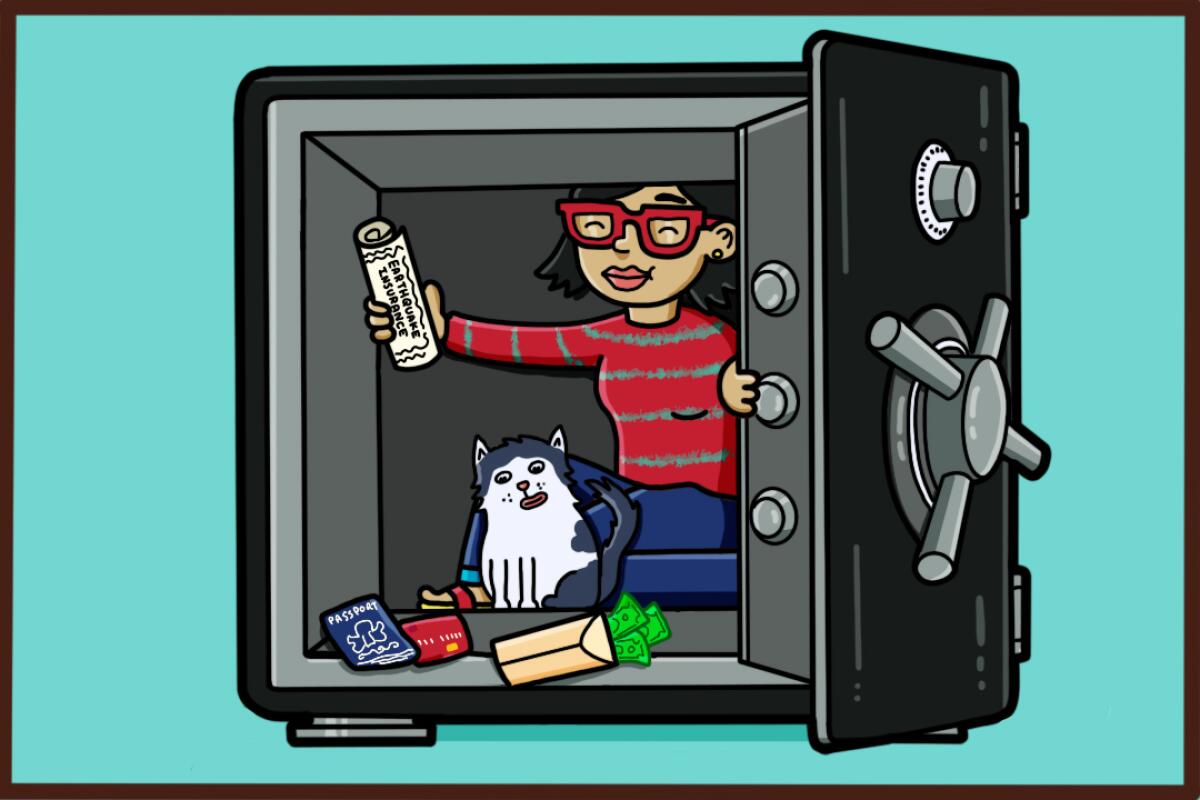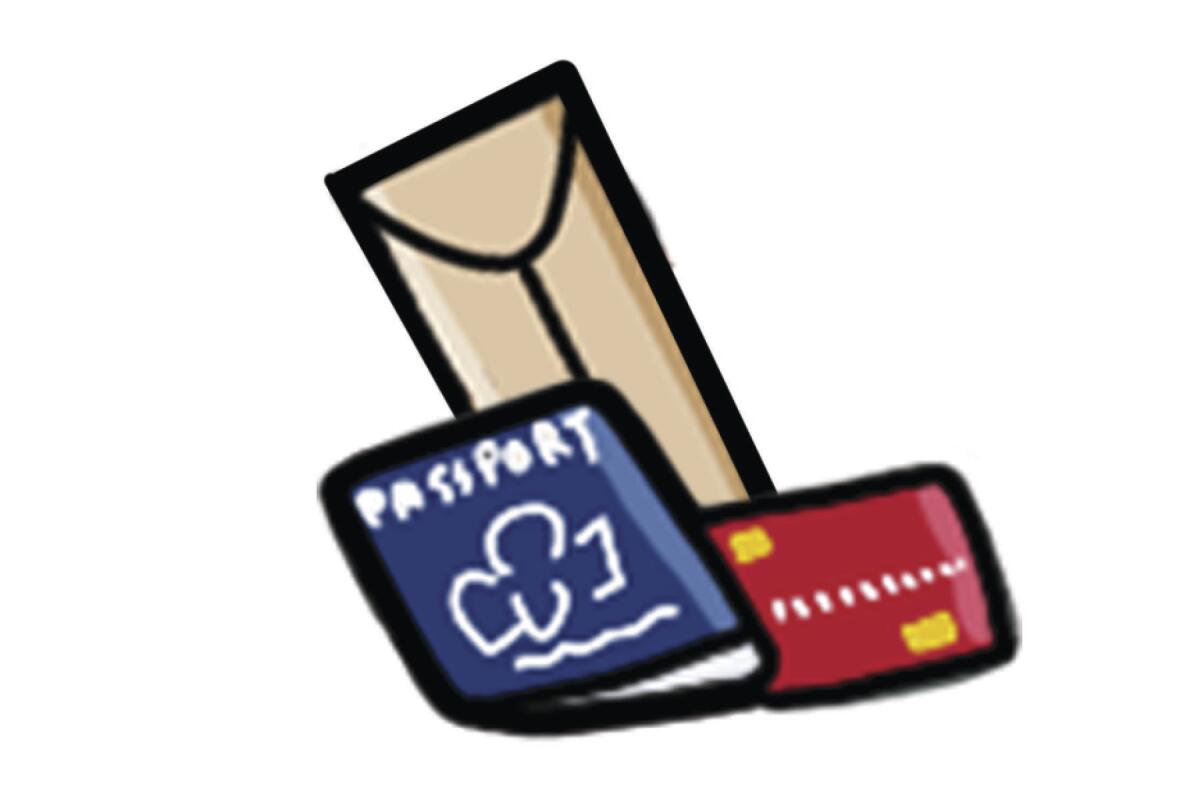Unshaken, Week 6: How to prepare your finances for earthquakes

Hello! My name is Jessica Roy — remember me from way back in Weeks 1 and 2? In this sixth and final installment of Unshaken, the Los Angeles Times newsletter guide to earthquake readiness and resilience, we’re going to earthquake-proof your finances.
You’re doing three things today: setting aside some cash to have on hand, organizing your important documents and getting your insurance coverage in order.
Get some cash
In an emergency — an earthquake, a fire or any freak weather event — there’s a possibility the power will go out. That could mean credit card readers and ATMs wouldn’t work. You want enough cash stashed in your house to, at minimum, fill up a tank of gas (also subject to power disruptions, by the way) and buy a few days’ worth of food, water and immediate necessities such as first-aid supplies and flashlight batteries. Price gouging in an emergency is illegal, but in a crunch, it’s better to be able to fork over cash for essentials than risk going without something you need.
Ideally, you would have enough cash to do that and also pay for a couple of nights in a motel in case you need to evacuate. So plan to have at least $60 in an envelope somewhere, but optimally around $500. Small bills are better than large ones because the person you’re buying from might not have change on hand. Keep the cash with the rest of your earthquake kit in case you have to grab and go.
Agenda item: Hit up an ATM and set aside your emergency cash.
Support our journalism
Subscribe to the Los Angeles Times.
Gather your documents
You might need to leave your home quickly in the event of an emergency. Are copies of all your important documents in your earthquake kit and in the cloud? Here’s what to include:
— Vital documents, including birth certificates, passports, Social Security cards, marriage licenses, immunization records and advance directives like living wills.
— Copies of your IDs and insurance documents.
— A list of emergency contact numbers (in case the power goes out and your cellphone dies).
Agenda item: Make copies of all your important documents, and have them in your earthquake kit and uploaded to the cloud.

Should you get insurance?
You may already have homeowner’s or renter’s insurance. But in most cases, those don’t cover earthquake damage. You need to do some math and figure out whether it’s worth it to carry a separate policy for earthquakes.
My colleague David Lazarus covered this in depth in a 2019 column, and he opted to buy a policy. But depending on your living situation, it might not make sense for you.
A couple of things to keep in mind for the majority of Angelenos who don’t own a home: If you rent, it’ll probably be pretty cheap ($10 to $20 a month), because you’re not insuring the home, just your stuff. If you own a condo, your building’s policy might cover some of the bigger-picture structural stuff. Check with your HOA to figure out exactly what is covered.
Take some time today to crunch the numbers and decide what to do. The California Earthquake Authority has a premium calculator that doesn’t require you to sign up or give them a phone number or email address — just plug in some numbers and it will tell you what you can expect to pay in monthly and annual premiums for coverage. It offers separate calculators for renters, homeowners, condo owners and mobile home owners.
If you haven’t already documented your belongings for another insurance policy, this is a great time to do it. Take photos of your valuables that you’d need or want to replace and upload them to the cloud. You may not be covered for earthquake damage, but your stuff probably would be covered by your regular renter’s or homeowner’s insurance policy under circumstances that could happen after the quake, such as a fire or theft.
Agenda item: Price out the cost of earthquake insurance and decide whether it fits in your budget. Document your valuables for insurance purposes either way.
You did it!
That’s it! You’ve completed Unshaken, the L.A. Times newsletter guide to earthquake readiness and resilience. If you found this newsletter helpful, please share it with your friends, family and neighbors — they can sign up here. Comments, questions or suggestions? Drop us a line at unshaken@latimes.com.
In about a month, we’ll send you a brief reminder about some of the things you’ve learned and need to keep on top of — such as checking smoke alarm batteries, rotating water supplies and checking expiration dates on food in your earthquake kit.
And before we go, here’s a reminder that one of the most important things you can do to set yourself up for recovery after an earthquake or any disaster is to talk to your neighbors. Read more here.
For complete coverage of earthquakes in Southern California and beyond, go to latimes.com/earthquakes. Thanks for reading.
More resources
— One of the most important things you can do to prepare for an earthquake is talk to your neighbors, writes seismologist Lucy Jones.
— Thinking of buying a premade earthquake kit? We unboxed four of them, from $30 to $300.
— If all you have to eat in your emergency kit are granola bars and canned tuna, here’s how to up your game. Plus here’s some advice from L.A. food people.
— How does California’s earthquake early-warning system work? And what apps should you have on your phone?
Start your day right
Sign up for Essential California for news, features and recommendations from the L.A. Times and beyond in your inbox six days a week.
You may occasionally receive promotional content from the Los Angeles Times.




